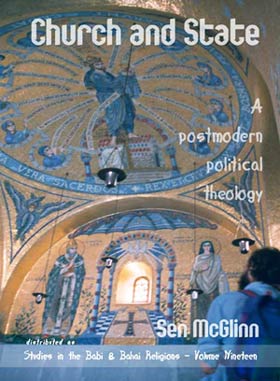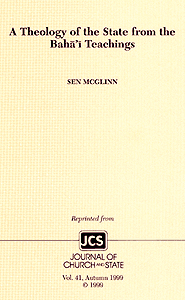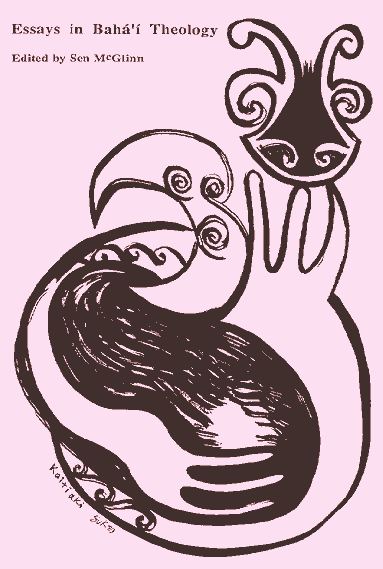Open Circle Publishing
Bahá´í related Books

2005: Church and State
A postmodern political theology
by Sen McGlinn
This is a political theology for the Bahá´í Faith, but it is also a
philosophy for living in our globalising, postmodern society. The
functional differentiation of society means that government,
religion, commerce, art, education and science are increasingly
independent, have different social functions, relate differently to
one another, and that their lived meanings for us are different.
Functional differentiation also drives the pluralism and relativism,
global scope and individualisation that characterise postmodern society.
In a society in which religious ritual is the mirror of individual
distinctiveness, not of collective identity, in which permanent pluralism
means n that no one religion can provide common norms and values, and no
ideology should try, and in which the norms of one sphere of life are not
transferred to other spheres, religion must find a new understanding of
itself, and a new job description for its role in society. The 20th
century has taught us that economic affairs cannot be governed by
political ideologies, that science must be free of doctrine and political
agendas, that church and state must be separated. But it has not provided
us with a new world view that explains the postmodern world that we
actually experience.
This book draws on the Bahai scriptures, and the
Bible and Quran, to show that the differentiation and globalisation of
postmodern society are signs that the Kingdom of God is growing in the
world.
Available from www.kalimat.com/church_and_state.htm and Amazon.com (search on McGlinn + Postmodern)

1999: (Article Reprint from the Journal of Church and State, U.S.A.)
A Theology of the State from the Bahá´í Teachings
by Sen McGlinn
This article seeks to provide a religious rationale for embracing the multi-centred post-modern society, and for rejecting monist social models. In particular it provides a theological underpinning for the separation of church and state. Its thesis is that church and state are distinct in the Kingdom of God, and the Kingdom of God is growing on earth where church and state are distinct, but closely related.
The first part explains the Bahá´í teachings regarding civil government and its relationship to institutional religion, on the basis of selections from the Bahá´íscriptures. It concludes with some elements of a Bahá´í political theology. The second part suggests a metaphysical model that justifies the organic model of society, in which the religious and political order are properly distinct organs with differing logics, and no one organ can control the whole or claim a unique relationship to the divine. The argument in this section is presented in a neoplatonic language common to theologies of the Western monotheistic faiths, in the hope that this approach may be of use for theologians of other Faiths.
The booklet (15 x 20 cm) of 26 pages, softcover, costs 6 Euros plus postage.
Email: sonjavank-AT-hotmail.com

1989: (1994, 2nd edition)
Soundings: Essays in Bahá´í Theology
Edited by Sen McGlinn
Contents:
Writing history in a secular age
by Karen Austin
Father, Son and Holy Spirit in Christianity, Islam, & the Bahá´í Faith
by Bronwyn Elsmore
Introduction fo the Bible in modern research
by Sen McGlinn
Anti-positivism, teaching and the Bahá´í Faith
by Alison Marshall
Religious belief and the mutability of scientific theory
by William Michael
Is the Bahá´í Faith a world religion?
by Moojan Momen
The (1994) book (15 x 20 cm) of 64 pages, softcover, (first published in 1989, second edition, 1994) costs 10 Euros plus postage costs. Five illustrations by Sonja van Kerkhoff.
Email: sonjavank-AT-hotmail.com